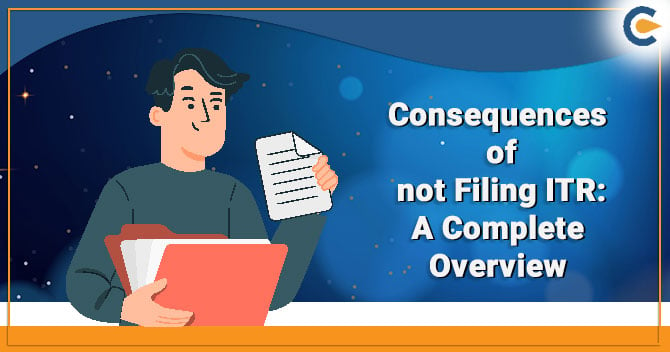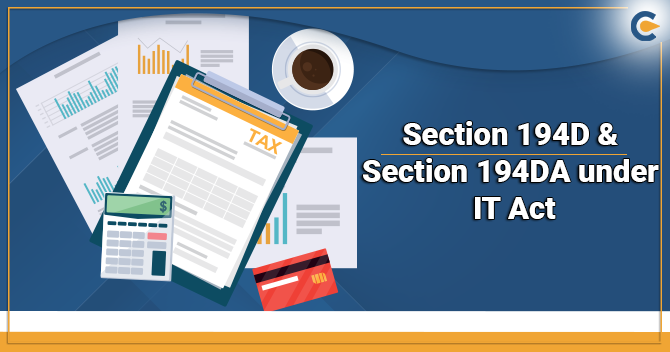Filing an income tax return is something you can’t afford to overlook considering the repercussions that exist within the law. In the write-up, you will become accustomed to the potential consequences of not filing ITR. So let’s get started without any further ado.
The IT authority possesses the right to carry out best judgment assessment as per section 144 of the IT Act, in case of non-filing of ITR by the taxpayers. It is pertinent to note that March 31st of every assessment year is the last date for filing an income tax return. Every taxpayer must abide by this rule of filing or else penalties would be levied as per Act.
Possible consequences of not filing ITR
- In case the ITR is not submitted by the aforesaid date, then such return shall be treated as time-barred. Under this scenario, the taxpayer is not allowed to file the ITR for the assessment year as there are no provisions in the Act that support such nature of the filing.
- If it is found that the taxpayer has intentionally skipped the ITR filing for the sake of tax evasion then he/she may confront severe penalties.
- If the taxpayer posses a taxable income and fails to file the return for the same then there are enabling norms to impose a penalty under section 270 A for equivalent to 50% of the tax which might be skipped by the taxpayer via non-filing.
- Moreover, the IT authority possesses the right to initiate prosecution in view of section 276CC of the IT Act against the tax defaulters. The Act specifies the rigorous imprisonment for a term not less than three months, which may be extended to two years. In addition to this, a fine may be imposed.
- Also, in case if the evaded tax amount surpasses Rs 25,00,000, then the defaulter may face imprisonment for 6 months-7 years in addition to the fine.
- No trial can be executed against the taxpayer where the amount accrued via tax evasion activities remains within the permissible limit (Rs 10,000).
It is vital to remember that the IT authority has the right to carry out the Best judgment assessment u/s 144 of the Income Tax Act where the taxpayer has committed the filing default. But, section 119(2)(b) vests IT authority with the right to admit any forms or claim for an exemption, refund, deduction, or any other relief even after the expiration of the period cited under the Income Tax Act.
Read our article:Section 269ST of IT Act 1961: Explained with Examples
A Close look at penal provisions for non-filing of return as per u/s 139(1)
Apart from these repercussions, the additional penal provisions for non-filing of return as per u/s 139(1) of the IT Act may cover taxpayer whenever he/she submits the return after availing permission under section 119 of the IT Act which includes the following
- Delayed filing fees under section 271F of the Income Tax Act worth Rs 10,000 for AY 2020-21 where such filing is done after the due date under section 139(1) of the IT Act. But, if the taxpayer’s taxable income is up to Rs 5,00,000, such fees would be limited to Rs 1000.
- Additional interest under section 234A would apply @ 1%/month or part of the month for the tax amount remaining unpaid.
- The taxpayer may also lose out on specific deductions and carry forward losses owing to delayed filing as per the u/s 139(1) of the IT Act.
Highlighting consequences of not Filing ITR under section 234F of the IT Act
If a taxpayer fails to submit a return of their taxable income on time as per section 139, then such individual may confront a penalty of
- Rs 5000, if the return is submitted on or before the Dec 21 of the Assessment year
- Rs 10000 in any other scenario provided that if the overall income does not surpass Rs 500000, the fee payable as per this section shall not surpass Rs 1000.
Details Regarding the Late Filing Fee
| Date of E- Filing | Overall income Below Rs 5,00,000 | Overall income Above Rs 5,00,000 |
| 10th Jan 2020 | Rs 0 | Rs 0 |
| Between 10th January 2021 to 31st March 2021 | Rs 1,000 | Rs 10,000 |
Key takeaway:
- If you have encountered any losses during the assessment year, make sure to submit a timely return with the prescribed due date. Failure to this would prevent you from carrying forward such losses to the subsequent years for set off against income in upcoming years.
- In case you are eligible to obtain refunds for excess tax submission, you must submit your ITR before the due date to obtain the refund as early as possible.
- If you do not file IT returns on or before the due date, you will be entitled to pay interest @ of 1% for every month, or part of a month, on the sum of tax remaining unpaid as per section 234A.
Conclusion
It is in the best interest of taxpayers to make a timely return considering the above-mentioned consequences of not filing ITR. The income tax department makes a continual effort to nudge down the likelihood of tax evasion by altering the existing provisions whenever necessary. Therefore, holding ITR for unnecessary reasons could be detrimental for taxpayers both in terms of credibility and short-term benefits. Also, it is not wise to wait for the due date and expect the date extension as it entirely depends on the Government’s[1] discretion
Read our article:IT Return for the Deceased: A Detailed Outlook











